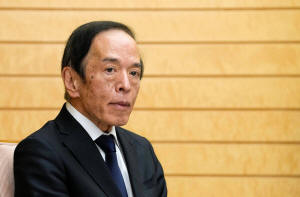New BOJ chief says he wants more time to gauge inflation trend
 Send a link to a friend
Send a link to a friend
 [April 10, 2023] By
Leika Kihara and Tetsushi Kajimoto [April 10, 2023] By
Leika Kihara and Tetsushi Kajimoto
TOKYO (Reuters) - Japan's new central bank governor Kazuo Ueda said he
wants more time to judge whether wage growth will be sustained enough to
keep inflation stably at the bank's 2% target, suggesting he will be in
no rush to dial back its massive stimulus.
Ueda faces a bumpy road as slowing global growth clouds the prospects
for a sustained pickup in inflation and wages, a prerequisite for
phasing out his predecessor's controversial monetary stimulus.
"When looking at current economic, price and financial developments,
it's appropriate to maintain yield curve control for now," Ueda said in
an inaugural news conference on Monday.
If the BOJ sees that it can achieve its price target, it might need to
normalise monetary policy, he said. "If not, we may need to come up with
a more sustainable framework with an eye on the side-effects of monetary
easing."
The 71-year-old academic's term began on Sunday, succeeding Haruhiko
Kuroda, whose second, five-year term ended on Saturday.

Markets have been rife with speculation the BOJ could soon phase out
yield curve control (YCC), a policy that caps the 10-year bond yield
around zero, due to growing criticism that it distorts markets and hurts
bank margins.
In parliamentary confirmation hearings in February, Ueda stressed the
need to keep ultra-easy policy to ensure Japan sustainably achieves the
BOJ's 2% inflation target backed by wage growth.
But with inflation exceeding the target, many analysts expect the BOJ to
tweak or end YCC, a policy combining a 0.1% target for short-term
interest rate and a 0% cap for the 10-year bond yield, as soon as this
quarter.
Long-stagnant inflation and wage growth in Japan are beginning to show
signs of reviving. After touching a 41-year high of 4.2% in January,
core consumer inflation remains above 3% as more firms hike prices in
response to rising raw material costs.
[to top of second column] |

New Governor of Bank of Japan Kazuo Ueda
waits for Japanese Prime Minister Fumio Kishida before their meeting
at prime minister's official residence in Tokyo, Japan, April 10,
2023. Kimimasa Mayama/Pool via REUTERS

To compensate households for the increase in living costs, major
firms have offered wage hikes of nearly 4% this year in annual
labour talks, the fastest pace in about three decades.
"The outcome of this year's spring wage negotiations is welcome. But
it's necessary to scrutinise whether this move will be sustained,"
Ueda said.
Mounting U.S. recession fears are among headwinds for Japan's
export-reliant economy. While the end to COVID-19 curbs is propping
up consumption, some analysts warn a recent slew of price hikes for
daily necessities could also hurt spending.
Ueda will chair his first policy meeting on April 27-28, when the
board produces fresh quarterly growth and price forecasts extending
through fiscal 2025.
Markets are focusing on whether the board projects inflation
accelerating towards, or even hitting, 2% in fiscal 2024 and 2025.
Under current forecasts, the BOJ expects core consumer inflation to
hit 1.6% for the fiscal year that began this month and accelerate to
1.8% the following year.
Ueda served as BOJ board member from 1998 to 2005, when the central
bank introduced zero interest rates and quantitative easing to
combat deflation and economic stagnation.

(Reporting by Leika Kihara and Tetsushi Kajimoto; Additional
reporting by Yoshifumi Takemoto; Editing by Sam Holmes, Toby Chopra
and Hugh Lawson)
[© 2023 Thomson Reuters. All rights
reserved.]
This material may not be published,
broadcast, rewritten or redistributed.
Thompson Reuters is solely responsible for this content. |